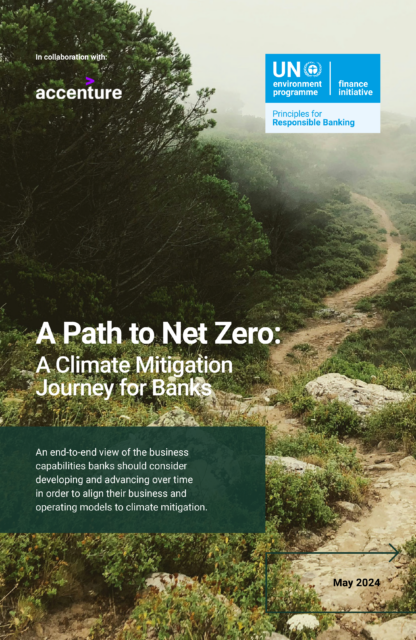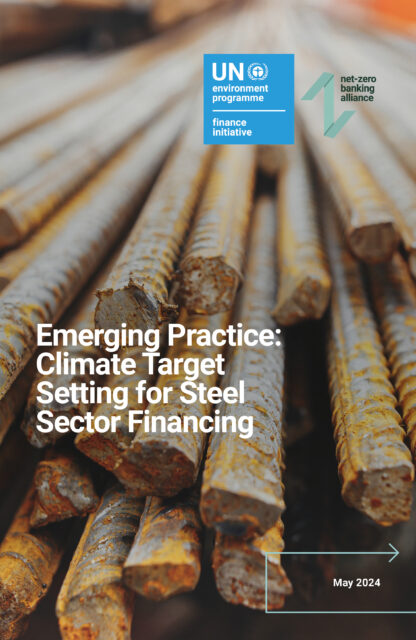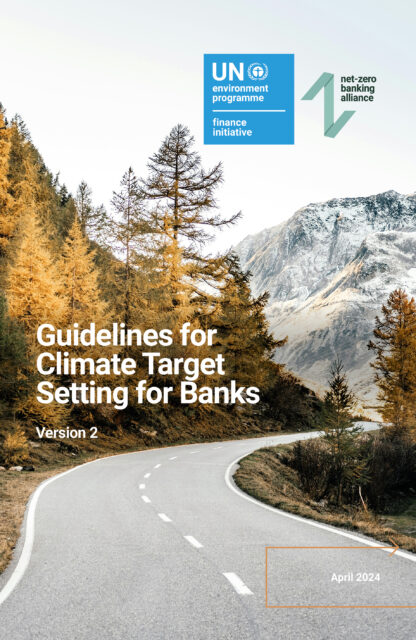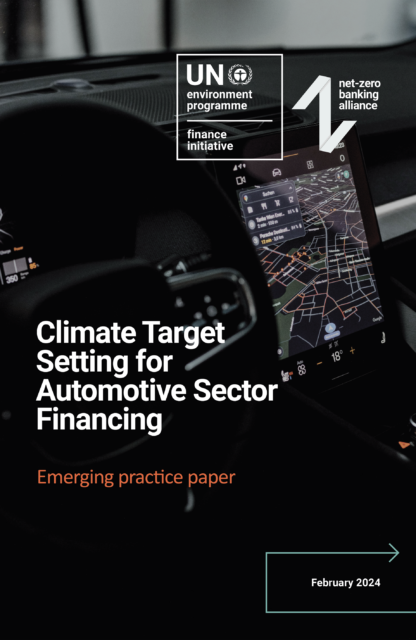
07 March 2023Climate Change, Publications, Risk, TCFD
POPULAR CONTENT

07 March 2023Climate Change, Publications, Risk, TCFD

17 May 2022Events, Roundtables

19 December 2023Banking, Climate Change, Insurance, Investment, Nature, News, Policy, Pollution & Circular Economy, SDGs and Impact, Social
Banking, Climate Change, Net Zero Banking, Principles for Responsible Banking, Publications | 20 May 2024
The Climate Mitigation Journey (CMJ) is a manual for banks outlining the business capabilities they need to build and iterate for years to come as they are looking to align themselves with the Paris goal of 1.5°C global warming and net zero, as part of their commitments under the PRB and/or NZBA.

Banking, Climate Change, Net Zero Banking, Publications | 17 May 2024
The 'Supporting Notes for Version 2 of the Guidelines for Climate Target Setting' offer clarification on several aspects of the 'Guidelines for Climate Target Setting for Banks - Version 2' which Net-Zero Banking Alliance (NZBA) member banks voted to adopt in March 2024. The updated version of the guidelines has applied to all new targets and any new iterations of existing targets set by NZBA member banks since 22 April 2024.

Banking, Climate Change, Net Zero Banking, News | 16 May 2024
Robert Spruijt, Head of Sustainable Finance EMEA, ING talks about assessing client transition plans and data tools in our latest interview with a finance professional at a member bank.

Banking, Climate Change, Net Zero Banking, Publications | 02 May 2024
'Climate Target Setting for Steel Sector Financing' is the third in a series of publications developed by members of the Net-Zero Banking Alliance (NZBA) with the goal of assisting banks by outlining the choices they face when setting climate-related targets for financing in various carbon-intensive sectors of the real economy.

Banking, Net Zero Banking | 21 March 2024
NZBA member banks commit to set science-based, 1.5-degree aligned targets for their financed emissions within 18 months of becoming a…

Banking, Climate Change, Events, Net Zero Banking, Principles for Responsible Banking, Webinars | 13 March 2024
Along with the NZBA Commitment Statement, the guidelines detail the commitment that each bank makes by being an NZBA member. NZBA member banks led a review of the guidelines from early 2023 to early 2024. Based on these consultations, NZBA sent a series of proposed updates to the membership in February 2024 that members voted to adopt. This webinar shared insights on the adopted updates.

Banking, Climate Change, Net Zero Banking, News, Principles for Responsible Banking | 13 March 2024
NZBA member banks vote in favour of adopting updated guidelines Emissions attributable to banks’ capital markets services included for first…

Banking, Climate Change, Net Zero Banking, PRB Guidance, Principles for Responsible Banking, Publications, Target Setting | 13 March 2024
'The Guidelines for Climate Target Setting for Banks - Version 2' outline key principles to underpin the setting of credible targets in line with the science and achieving the most ambitious temperature goals of the Paris Agreement.

Banking, Climate Change, Europe, Net Zero Banking, News | 29 February 2024
We recently spoke to James Close, Head of Climate Change and Environment at NatWest Group in the latest on our…

Banking, Climate Change, Net Zero Banking, Publications | 15 February 2024
'Climate Target Setting for Automotive Sector Financing' is the second in a series of publications developed by members of the Net-Zero Banking Alliance (NZBA) with the goal of assisting banks by outlining the choices they face when setting climate-related targets for financing in various carbon-intensive sectors of the real economy.
